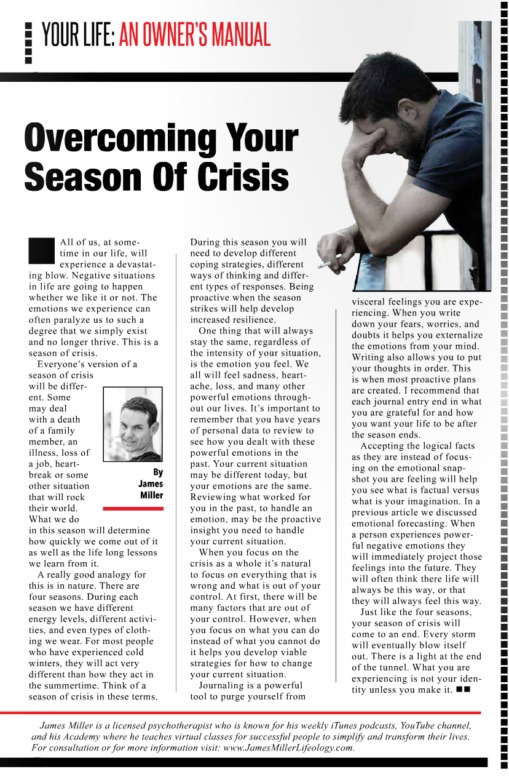All of us, at some time in our life, will experience a devastating blow. Negative situations in life are going to happen whether we like it or not. The emotions we experience can often paralyze us to such a degree that we simply exist and no longer thrive. This is a season of crisis.
Everyone’s version of a season of crisis will be different. Some may deal with the death of a family member, an illness, loss of a job, heartbreak, or some other painful situation that will rock their world. What we do in this season will determine how quickly we come out of it as well as the long life lessons we learn from it.
An excellent analogy for this is in nature. There are four seasons. During each season, we have different energy levels, various activities, and even types of clothing we wear. For most people who have experienced cold winters, they will act very differently than how they act in the summertime. Think of a season of crisis in these terms. During this season, you will need to develop different coping strategies, different ways of thinking, and various types of responses. Being proactive when the season strikes will help you build resilience.
One thing that will always stay the same, regardless of the intensity of your situation, is the emotion you feel. We all will feel sadness, heartache, loss, and many other powerful emotions throughout our lives. It’s important to remember that you have years of personal data to review to see how you dealt with these strong emotions in the past. Your current situation or the scenario may be different, but you’ve felt these same feelings before. Remembering this helps you reflect on your history. When did you feel these same emotions before? What did you that was helpful? What did you do that wasn’t helpful? You don’t have to start from scratch, thinking, “What am I going to do now?”
When you focus on your current crisis, it’s natural to focus on everything that is wrong and what is out of your control. At first, there will be many factors that are out of your control. However, the rule of thumb is to focus on what you can do instead of what you cannot do. This helps you develop viable strategies for how to change your current situation.
Journaling is a powerful tool to purge yourself from overpowering feelings you are experiencing. When you write down your fears, worries, and doubts, it helps you externalize the emotions from your mind. Writing also allows you to put your thoughts in order. This is when most proactive plans and ideas are created. I recommend that each journal entry end in what you are grateful for and how you want your life to be after this season ends.
In psychology, we have a term called Radical Acceptance. Radical Acceptance simply means we accept the facts as they are. It doesn’t mean we like the facts, agree with the facts or let people off of the hook for their actions. It simply means you use your logic to say what is the reality right now. After that, you ask yourself, “What are my options?”
In another chapter, we discussed Emotional Forecasting. When a person experiences powerful, negative emotions, they will immediately project those feelings into their future. They will often think their life will always be this way, or that they will always feel this way.
Just like the four seasons, your season of crisis will come to an end. Every storm will eventually blow itself out. There is a light at the end of the tunnel. What you are experiencing today is not your identity or your future.


 We all get overwhelmed and sometimes don’t know what to do. LIFE LESSONS is your new “go-to” book to help you navigate life.
We all get overwhelmed and sometimes don’t know what to do. LIFE LESSONS is your new “go-to” book to help you navigate life.